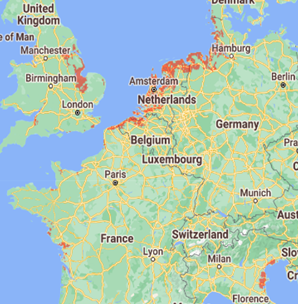The research project A) aims to understand more closely what kind of perceptions and attitudes different stakeholders have about mobility/retreat as an adaptation strategy to climate change and how to respond to it, in a European context. The research will focus particularly on how stakeholders in European contexts impacted by sea level rise perceive the future of climate migration both in terms of people relocating towards Europe as well as people relocating within Europe.
In the project we also B) aim to understand how the perceptions of various stakeholders about climate migration and particularly mobility related to sea level rise compare and differ from the perception of experts (such as researchers and project managers) and what consequences this might have? In other words, there is a need to understand more closely the discrepancy between the perceptions of all the other stakeholders, compared to those of experts in the field.
In terms of impact, we need to C) understand how to address the gap that exist between expert perceptions and the perceptions of other stakeholders who have a direct influence over climate mobility processes in one way or another.
The project will address the following research questions:
- RQ1: How is sea level rise related climate mobility/retreat (both towards Europe and within Europe, also comparatively) as an adaption strategy to climate change perceived by different stakeholders, particularly in comparison to other adaption strategies such as accommodation and protection?
- RQ2: What kind of future imaginaries regarding sea level rise and sea level rise related mobility do different stakeholders have?
- RQ3: How do the perceptions of various stakeholders compare and differ especially with the perception of field experts (such as researchers and project managers in the field of sea level rise and climate migration)?
The project is conducted in 2024-2027.
The project is funded by the Kone Foundation.
The stakeholder perceptions
We will carry out a comparative analysis of how mobility (to Europe as well as within Europe) as an adaptation strategy is perceived in selected European local and national contexts by five key stakeholder groups:
- policy makers
- local residents in areas at particular risk of sea level rise
- individuals who have already migrated within or towards Europe due to climate change related factors
- experts such as researchers and project managers in the field of sea level rise and climate related mobilities
- the media.
The contexts that we study
Three country contexts have been selected for the study: the Netherlands, the UK and Italy. These areas are identified as ones at particular high risk of sea level rise in Europe. The local contexts that will be included are the Wadden sea Islands in the Netherlands, the Portsea Island in the UK, and Venice in Italy, all of which represent European island contexts that at particular high risk of sea level rise.
Land projected to be below annual flood level in 2050

